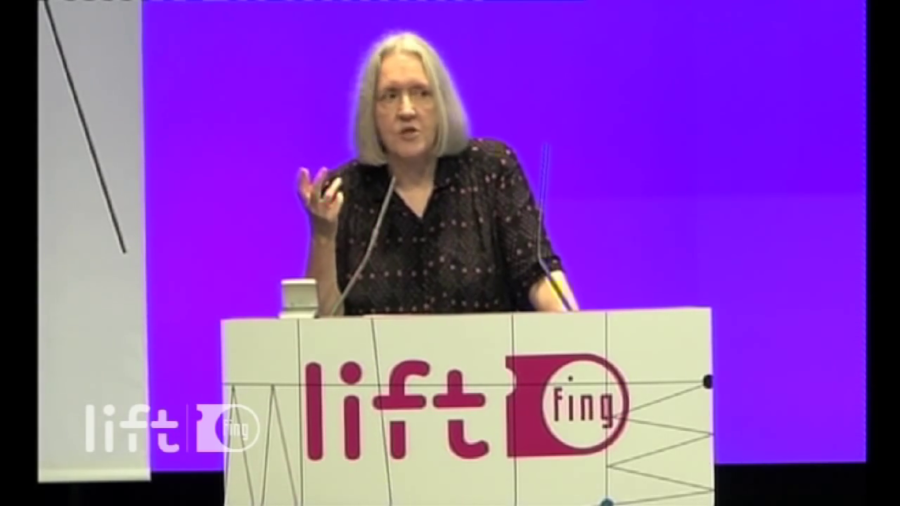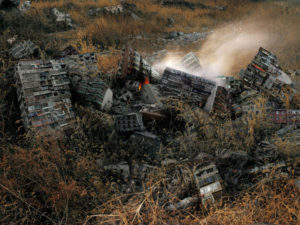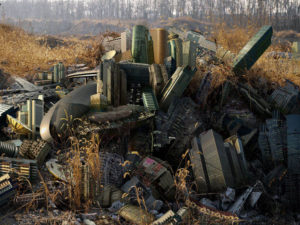What I’m talking about is part of a project/obsession, really, that I have with the notion of urbanizing technology, particularly urbanizing interactive networked technology. Now, the city’s a big subject. I was glad that you brought up also the greening. I work on all kinds—some of you may know that (I feel like Miss City.) I work on many aspects of the city. This is just one little slice. It’s the beginning of a project. It’s a bit of an experimental set of thoughts that I’m going to share with you. And the city has of course become a strategic space for all kinds applications of the new technologies. And I’m thinking of sort of computer-based technologies. There is Cisco Systems. There is all kinds of interesting counter, sort of against power, ubiquitous computing. There is a lot of it.
I stand back and I ask myself the question how much of this type of technical capability embedded, deployed, in urban space has actually been urbanized? And I’m not totally sure what the answer is. I really see this as a question that is on the agenda. Because just about everybody, every firm, etc. is thinking how do I use the city? At one end how do I make money off it? And at the other end how do I democratize it? How do I give voice? How do I produce distributed urban spaces, a distributed urbanity? So I do think it is an extraordinary project.
For me, the notion of urbanizing technology really is part of a larger sort of effort that I’ve been working on for a very long time. And it starts with the notion that interactive technologies— Well, technologies that enable interactive domains deliver, give, their technical capacities through ecologies that are more than just the technical capacity itself.
Now, I started working on this I don’t know, twenty-five years ago, it feels more like a hundred years ago. And I was for instance—just to situate the project—comparing how does finance, high finance, use these technologies versus civil society organizations? In many ways, they use the same features, the same properties. But it’s like a Phillips curve, a point of intersection. They use the same technical capabilities, but they’re coming from different points and going to different destinations. And so that alerted me to this notion that the actual interactive technology really operates—and that is why I am interested in interactive, by the way—it really operates in a broader ecology.
Now, sooner or later it had to happen to me—I arrived at the question of the city. What if that larger ecology is the city? Now, the city is a far more complex, far more anarchic space, than either civil society organizations, which can be quite anarchic but not quite as anarchic as the city, and of course in finance, which has a very clear aim though it sometimes loses out with that kind of clarity.
And when I look at a lot of the ubiquitous computing that is happening, a lot of it—not all of it—is actually tracking, measuring, giving feedbacks. But they’re feedbacks that are information. And they reveal often more about the technology than about the city. When I look at how technology is used in infrastructure, I find that a lot of it is actually enabling or altering, etc. a given infrastructure. I’m left with the question, what am I really asking when I ask how do we urbanize the technology? Urbaniser la technologie, en français.
And so a first step for me is the city is not just the materialities. There are the people, their practices, the subcultures, you know… It’s sort of really a conglomerate of things. That notion of the city allows you to sort of understand that the city is capable of talking back. It talks back. Think of Rome. If Rome would have stayed where it was, it would be dead today. It would be dead. The only reason that Rome still exists as a city—think of Istanbul, any of our old cities, Marseilles, probably. It’s because it keeps talking back. It talks back in many many different ways, and thereby sort of enacts the incompleteness of the city.
And so to me this notion of incompleteness, this notion of talking back, are two critical variables to begin to understand, to begin to mark, if you want, an analytic terrain where we can think about urbanizing technology. It is not enough that it be interactive just in the most elementary way. There is a lot of interactive technology right now in the city. You can go buy a train ticket and the machine talks back, etc. but that’s not the kind of interactive that I’m thinking about.
And so a first sort of a way of thinking about it is this notion of the city, but let me just put it in terms of cityness, a term that I sort of at some point found myself using and I sort of like it. I have a few very silly slides, by the way. They have nothing to do anything serious but I love them. They’re all made by artists and the names of the artists are at the bottom. So a first notion is for instance take an oil rig—you know what that is, right?—and urbanize it. Here it is:
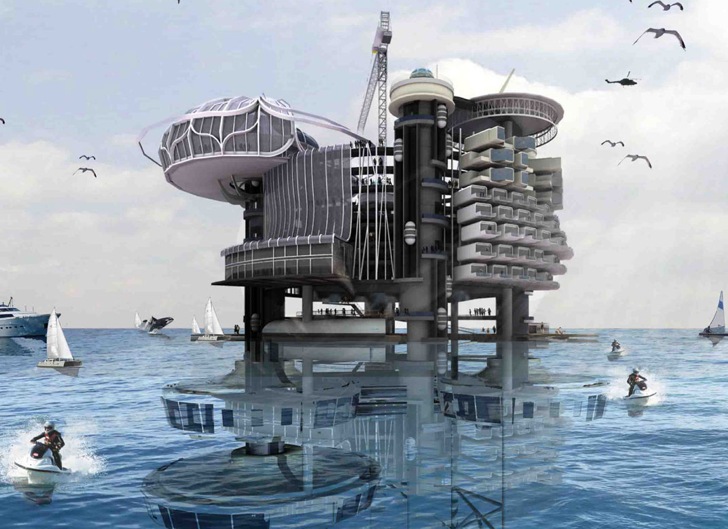
Image via “Abandoned Oil Rigs Reborn as Bustling Aquatic Villages”, Inhabitat
This is a design by architects; again the name is at the bottom. And to me this is extraordinary. You don’t totally eliminate, but by God you’re talking back to that oil rig. You are making something out of it. I don’t want to make too much out of this one. But I do think that that oil rig is much better than this:

Shanghai Tower, Thornton Thomasetti
This to me deurbanizes space. Now, I’m just talking about urban materialities to get at my subject.
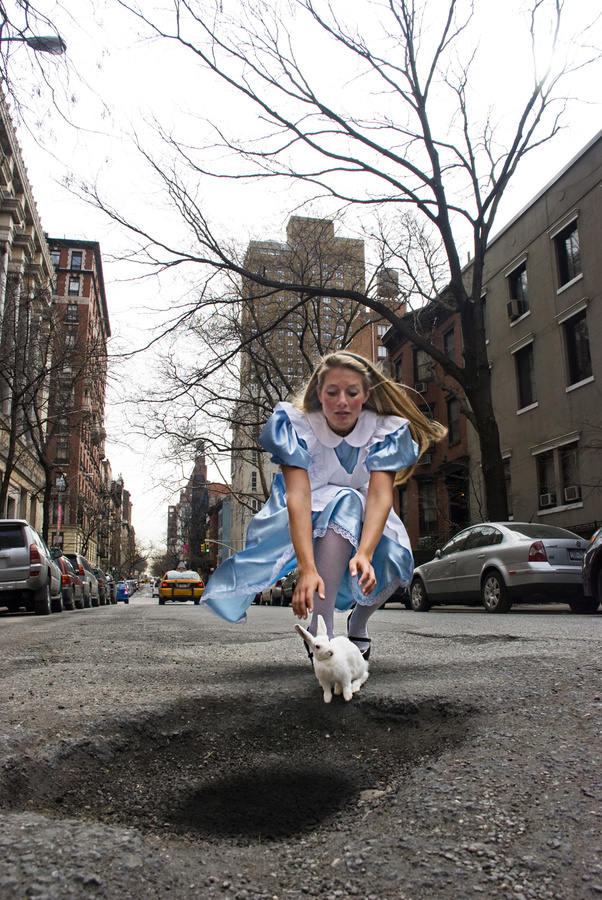
Davide Luciano, Mypotholes
Now, more playful are some of these series—you may have seen them—about potholes. The city talking back. Could this pothole in the road, street, where your car sort of gets hurt—is this the pothole as the proverbial hole where Alice in Wonderland sort of disappeared? Making wine—I selected this one because we’re in France. You know, use the pothole— Or fishing. These are elementary ways of thinking how urban space even in its most elementary version can actually talk back.
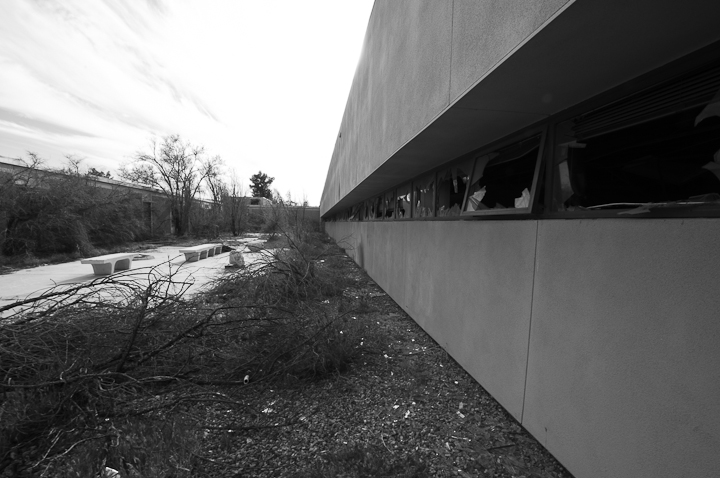
Image by Bradley L. Garrett from “Geographic Fractalisation”, used with permission
There are limits. This is dead urban space. This does not talk back. It would take a lot of effort. Similarly with this:
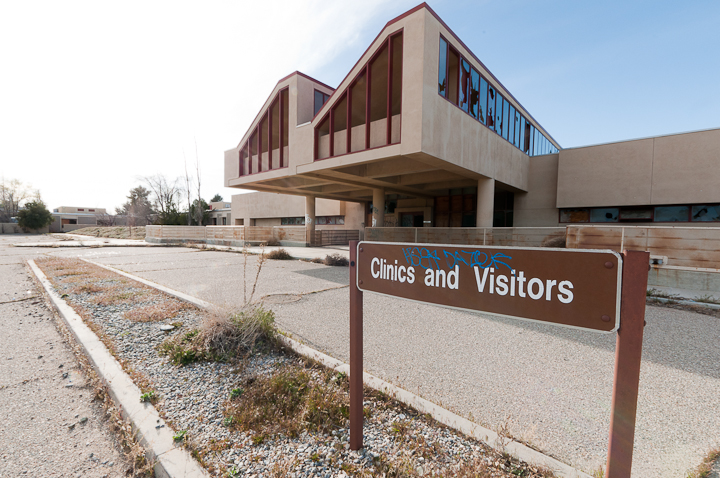
Image by Bradley L. Garrett from “Geographic Fractalisation”, used with permission
Brand new, underutilized. So when I say that the city talks back, I am actually suggesting that it can only happen under certain conditions. And here I saw this beautiful site. I love the language there, you know. “There he goes, one of God—” I just realized there’s God in here. that is not why I loved it, by the way. “One of God’s—” I can’t even read it. “—own prototypes.” This is what I want to get at: “A high-powered mutant of some kind never even considered for mass production. Too weird to live, and too rare to die.”
In many ways, I think that cities are a bit that way. They are weird. And they are all these mixes. And [there’s] also something about them that they do not die. When you think about our good old cities, they have outlived empires, kingdoms, republics, multinational corporations. They live on. And they live on, I think, because they’re incomplete. And because they talk back.
So when we’re beginning to sort of try to bring in the question of the technology, one first step for me is this notion of open source urbanism that I’ve begun to play with. Now, when you think about open source, and going back to that ecology that I talked about at the beginning, in a way the hacker or the open source person is going to the same space but it’s a different ecology of elements. So then the question becomes what would it mean to do open source urbanism? What does that actually entail? And secondly, sort of what does it mean if we start to think about the city as the hacker of a given technology, of a given space?
Another very little element, I don’t know if any of you followed that project that was presented in a book called Sentient City—some of you may know that—which is the too-smart city. The garbage can that spits back the garbage. The bench that evicts, ejects, the person who sits on it. There’s a whole series; it’s very amusing. But how can we begin to think about something that is either the image of the city as the hacker of a given technological space—in this case intelligent cities would come to mind—or open source urbanism?
Now, I have a whole variety of little elementary first steps that I like to take with this kind of material. And partly, to give you a very elementary image, this notion of talking back, there’s a famous episode that I love to talk about because it shows people—but the most elementary capacity. (This is not high tech, this is just you know…practice.) There was a park in New York in the 1980s when I had just arrived in New York. Riverside Park, which now is a beautiful gentrified park, etc. so now it’s not an issue. But at the time it was known [for] having murders, assaults, you didn’t go there. At some point, people—they hadn’t arranged it—began to have dogs because the whole neighborhood was dangerous. Then, you have a dog, you have to walk your dog. In walking the dogs in masses, battalions, of dogwalkers, they actually reappropriated the territory of the park. Now, one might think of that practice, and you can multiply the examples, as a kind of software. People’s practices—cityness—as a kind of software that can then be connected. How do the practices of people—
Now, I know that we’re going to hear all kinds of accounts that illustrate what I might call the urbanizing of these technologies. When it comes to intelligent cities, which I was also asked to address here, I think that one of their problems—and I’m talking not so much smart city with ubiquitous computing, but absolutely the intelligent city as a model. Cisco Systems, you know, Songdo is one example. Masdar is slightly different. And frankly there are hundreds of them being planned. They to me deurbanize technology. Because sure there’s a lot of interactivity in all that embedded technology. And there certainly is knowledge accumulation, there are feedback loops, adjustments to the practices of a given inhabitant of a particular building, etc. There is all of that. The technical capacities are at work. It is interactive, etc. But is it a deurbanizing of the larger space that is the city?
And so I say yes, part of the problem is that they’re a closed system. They aspire to being closed systems. And the city is not a closed system. The city is open, incomplete. These systems, I am not sufficiently knowledgeable about all the engineering aspects. But it seems to me that these are systems that really need a certain level of control to function. Which means that they’re pretty closed.
Secondly, they are enactments, almost exclusively, of the engineer’s logic. And coming back to my example of finance or civil society organizations, what these users do whether it is high finance which is really pushing the developments (sadly to say) in that technology, a very high-end user, or civil society organizations which mostly are not so high-end users, their logic is not the logic of the engineer. Their logic is the logic of finance, the logic of Amnesty International, of whatever it might be. And they work precisely because they sort of have an interesting interaction with the engineer’s logic. But it also means that the ABCD that the engineer’s logic has embedded into that technology does not necessarily get fully executed. And that is why so many predictions, I think, are wrong.
So once you’re dealing with an interactive domain, as opposed to a data pipeline or whatever infrastructure you’re dealing with, the fact that the user’s logic is not the same as the engineer’s logic means that there already is some sort of hacking happening. Whether it is finance or a civil service organization or whatever it might be. So the second point about intelligent cities, the fact that they are an enactment, and in a closed domain, an enactment of that engineer’s logic already tells me that they’re going to have limited possibilities, limited potential.
Now, the third issue with intelligent cities is that they don’t make visible the technology. The technology should be visible. This is something that I have talked about for a very long time, that all of this stuff should actually be visible. Because then it is interactive. Then something begins to happen. It becomes part of multiple ecologies. The technical infrastructures—the pipes, whatever it might be—becomes part of multiple ecologies depending on who is looking at it, who’s using it, etc. All of these feature that I think I could use the same images and describe cities, all of these are absent in the core of these intelligent cities.
So, one image is obsoleteness. Those systems, the hard core of the intelligent city system, is going to be obsolete because of that closedness, because it’s simply enacts the logic of the engineer. And this is one image. This is from a Chinese artist; I’m sure some of you seen this. And this is even better. All these fancy structures, obsolete. Now, it is here that I see the extent to which this deurbanizes the city. It kills them. It makes the whole city obsolete.
Now, I am not at all against using all kinds of technologies. But I do think in the case of the city—not all technologies but many technologies—we need to urbanize those technologies. So the image that I have again is this notion of urbanizing technology, open source urbanism, the city as hacker, and sort of the the foundational core image for any interactive technology, incompleteness. Because the logic of the users does not 100% correspond with the logic of the engineer. And out of that incompleteness comes in a way the mutant capacity that that has for cities, in short, a long life, and that for a lot of these interactive domains, especially if we begin to embed these technologies in urban space, becomes essential if they’re going to survive and we don’t wind up with all those piles of obsolete material. Thank you very much.
Moderator: Thank you, Saskia. A few questions for you. I think you touched on that, but do you think we will see in the near future a switch of power between countries and cities. Because we see that cities are becoming centers of innovation, centers of huge technology usage. A lot of new things started from states or cities like forbidding smoke, etc. So do you see cities taking the power on the international scene more than countries?
Saskia Sassen: Well, I think that power is a variable. And so the DNA of a lot of these interactive technologies is more akin to the DNA of a city. And in that sense, national governments, national states, are closed, highly-formalized—that is why cities have outlasted those kinds of systems. So they have a problem certainly at a time when we are trying to deploy all kinds of technologies.
Now, the national government, the state, has certain powers that cities don’t have. For instance, since you asked me, the environmental question. So, I think that if the COP meeting that just happened, if it would have been last fall, if it would have been cities in charge of the discussions, we would have gotten action. Cities are in a vanguard compared to national governments. Good national governments pass some good national laws, you know, which we need. But cities, in the United States right now we have eight hundred cities, no matter how regressive the politics of the mayors, who have sued the national government—it started under Bush, actually—for not implementing strong enough laws. Cities are hit by a lot of this stuff immediately, in a very material way.
So in essence the city is in a very different position. It is quite possible, as you suggest in your question, that this is a time when cities are actually concentrating a certain kind of power. But I think that the power of the city is a distributed power. And that makes me think again about this notion of open source urbanism. You know, there is something about the city that no matter [how] concentrated high-rise buildings in the center, you know, it sort of filters… So I think that the city is such a different algorithm from the national states—
Moderator: Both of them are mostly complementary rather than… It’s not one or the other—
Sassen: No no no, it’s complementary. It’s always complementary. But anyhow, yeah. I think I answered that question.
Moderator: This is my my personal question I sneaked in. I see all these changes coming and I wanted to ask you would you rather be the mayor of Detroit or Paris. You know, Detroit has—
Sassen: Detroit.
Moderator: —everything to rebuild and—
Sassen: Detroit.
Moderator: —Paris is kind of cluttered—
Sassen: I have zero doubt. Paris is almost perfect. I make a joke now, don’t take it too literally. No, Detroit.
You know, we have one thing that is happening is European artists are coming to Detroit because there’s a lot of space. It is a little like East Berlin, you know, after the Wall came down. Where artists just went and you just squatted in buildings. Detroit has enormous potential. Urban agriculture, of course, is a big one for Detroit. I smile because it is also an irony, but it is sort of interesting. So, I would rather be the mayor of Detroit.
Moderator: More potential. Somebody asked on Twitter how much of this type of technical capabilities you described are deployed in urban space is actually really urban? So I think the question— It’s mostly technologies that were intended to be urban, or they became urban because they were hacks…
Sassen: No. I think that a lot of these technologies don’t necessarily start with an urban concept. it’s just that this is like a moment of encounter. Here were the technologies happily doing their stuff, blah, blah, blah. And here were the cities happily doing their messy stuff. And this is a moment of encounter. Now, the encounter is shaped by multiple forces; some of it is pure business. I cannot tell you how many invitations—I’ve said no to all of them—I get from big meetings where they want to discuss—business meetings—where they want to discuss how can they sell whatever it is that there were develop[ing] in order to implement it in cities. But I do think that it is an interesting encounter.
Now, this question of urbanizing. A lot of the technology per se… You know, some of it might be urban. Social media are social media; that does not necessarily mean that they’re urban. However, if you come back to this image that if you’re dealing with interactive technologies, there is that larger ecology of elements that goes beyond the technology. That includes users, with their own logics, their own cultures, their own ideas. At that point, a technology embedded in interactive technology, embedded in a city, is dealing with a larger ecology. So the city can actually urbanize that technology.
And I love this notion of the city as hacker. You know, if you think, the hacker enters—or you know, the new WikiLeaks thing of…wiki hacker— We know there are all kinds of new things and new innovations there. So I think that the city does talk back. The city can alter. So Technology X can go to one kind of space or come to the city. And so a big agenda for research or debate is how many technologies that are really good—and again I’m thinking about interactive, but there are others. I just focus on interactive. How many of these ought to be urbanized? What would it mean?
So it can’t be just a set of options on a screen. Not much happening there, you know. It has to be that you’re producing a third space. And I think that third space is a kind of urban software that is a mix of peoples and spaces and needs and the garbage question and the potholes and I don’t know what all. But the pothole, [acts out tapping on a cell phone] you know this device where we can all say certain you know, satellites, etc. “Big pothole there.” I mean that is already a bit more. It sounds elementary. But the pothole question if you live in a city is a big one—especially in American cities. The French…perfect roads. But you can’t say that in New York, you know.
Moderator: You spent maybe a bit too much time in Paris, because we have challenging roads in France. A last question. I live in Switzerland, and some people say about Switzerland that it’s the opposite, it’s a country becoming a city. And you have access to— I just moved from the city back to the country, and I feel like I have almost the exact same experience in terms of technologies. I have the same Internet access. I have the same IPTV. And do you think technology is kind of blurring the frontier between city and not-city?
Sassen: Well you know, it’s not… Sure it can help that. Of course, absolutely. But it’s not only that that is blurry. You know, we really have a return of—like right now in New York, in American cities, the big fashion is urban agriculture. So New York City has a 112 farms. It’s a live website. And every day or every week they are hoping to add more. So I have a link to that website because I think it’s very interesting. I mean, it’s like almost… Chicago has passed ordinances where all roofs have to be green. Now, that’s not rural necessarily, but this duality of models, the urban: cement, the rural: green.
And of course the Chinese— I was invited to speak at the Shanghai Expo. And they are a bit neurotic right now about the rural areas, for all kinds of reasons that I cannot develop now. But they literally asked me to think aloud (they know that I like to think aloud like I just did with you people here) about a territorial format that encompasses both the urban and the rural, so that neither is fully urban nor is the other fully rural. And what you described about Switzerland, Switzerland has that a bit, actually.
Moderator: Exactly, we have the same services wherever you live. It’s a very interesting model. Thank you very much, Saskia Sassen.
Further Reference
Citations
- Cyberespace et science politique, “Les Affres Du Devenir « De La Ville Intelligente »”
- Planning the Smart City With Young People: Teenagers’ Perceptions, Values and Visions of Smartness
- Home office as new approach to smart city idea in pandemic time
- Стратегическое планирование в реализации концепции smart city
- Smart city strategies: time to involve people. Comparing Amsterdam, Barcelona and Paris
- Value Sensitive Design and the creative smart city
- Human rights and the city: Including marginalized communities in urban development and smart cities
- Smart City Visions and Human Rights: Do They Go Together?
- The Impact of Smart City Model on National Security
